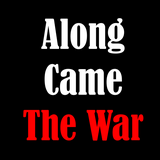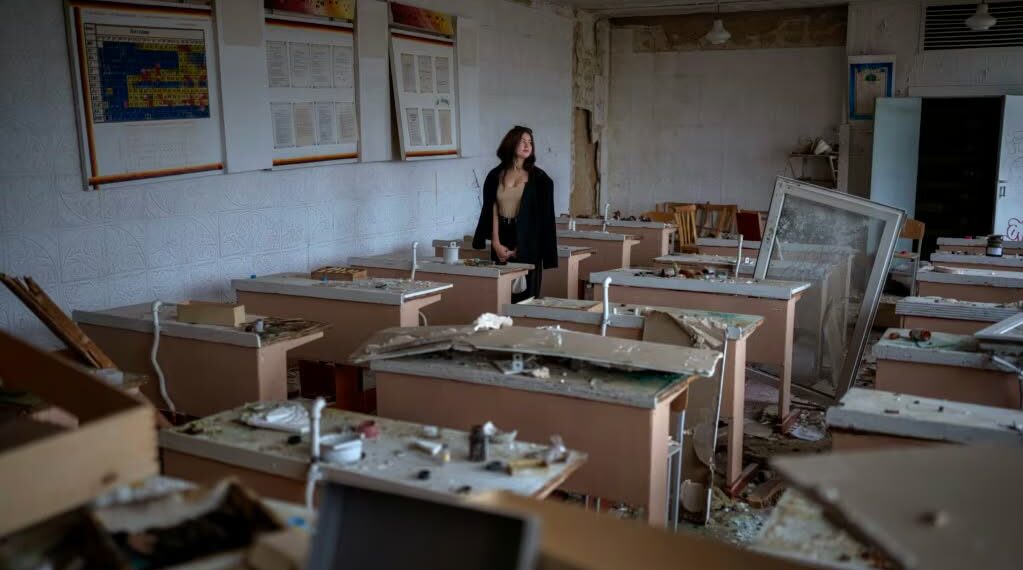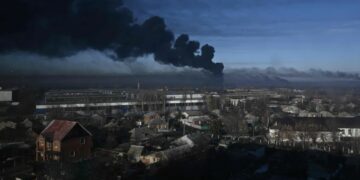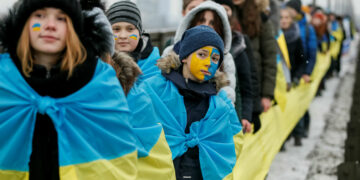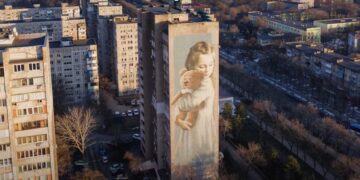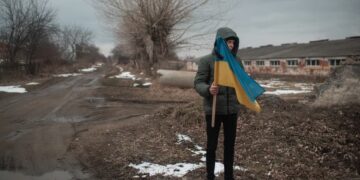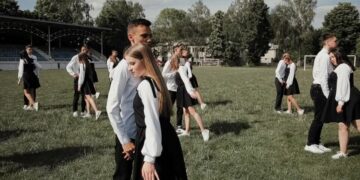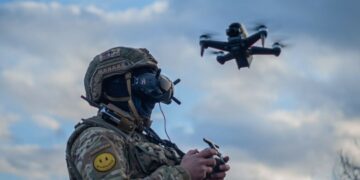The Russian invasion of Ukraine, especially its full-scale escalation in 2022, has caused a profound crisis of social disconnection, forcing countless individuals to face the fragility of their personal relationships. This collection of personal accounts captures the deep, often bittersweet sorrow of broken bonds—ranging from childhood friendships and close family ties to the broader sense of community itself.
A central theme is the widespread geographical dispersal of people. As a direct consequence of the war, friends and relatives were separated, with many fleeing abroad as refugees in search of safety. Students describe their closest friends relocating to Slovakia or Germany, or an aunt beginning a new life in Wales. While some families eventually reunited, for most, distance proved an insurmountable barrier. Physical separation soon led to emotional drift: shared experiences diverged, and conversations faded. Beyond distance, these testimonies reveal a deeper emotional alienation. The war has not only displaced people physically but also driven emotional wedges between them—sometimes due to differing life circumstances, sometimes over painful political disagreements. The most heartbreaking stories come from those with relatives in or near conflict zones.
The result is a shared, haunting sense of loss—what one writer calls “endless, soul-draining uncertainty” for those with missing relatives, and for others, the sorrow of knowing their loved ones are now “remote from the whole world, alienated.” Ultimately, these voices bear witness to the war’s invisible wounds: the quiet, devastating destruction of the personal connections that once gave life its meaning.
Sophia Holovko:
When I was younger, I went to the drama club for five years. Every study year the group has entirely changed; there were only a few people who continued going to the same group as me. The atmosphere in every group and the level of acting were different. I haven’t always enjoyed interacting with people around me or sharing scenes in the play with them. But just before the full-scale war had started, I went to the group where the majority of children had years of acting experience (just like me) and were older. That was the best group in my life; I felt like there was so much they could teach me. So many of them were incredibly interesting, talented, and smart. I remember waiting for my turn to go on stage at the rehearsal, looking at my groupmates, and thinking, «How lucky I am to be here with you.» I appreciated our connection and working together so much. We had our performance on the 9th of February, two weeks after the full-scale war started. The last day I saw my group was the 23rd of February. Since that day I lost connection with almost all the people from the group. Many of them went abroad and haven’t returned due to the war. Our drama club wasn’t working for months before the owners of the club decided to work, if not on plays, then just on training how to act. I still remember the group and the play we had together. For years it was a wound on my heart, and I couldn’t think of that time without sadness. Of course I continued going to the drama club, but since then it has never been the same. Almost all the people I met were just not interesting. I didn’t understand them, and they didn’t understand me either. Now I keep memories about my favourite group like a treasure in my memory, and I’m happy at least that I had it all, even if I can’t have it anymore.
Vlada Hotovtseva:
In a more mature and conscious age, I try to choose loyal and trustworthy friends. Even though almost all of my best friends left the country after 2022, I still keep in touch with them.
But there was a period in my life when I lost almost all my friends because of the war. I moved from Donetsk to Irpin in 2017, right after finishing the 5th grade. I had many friends in Donetsk, and I really wanted to stay in touch with them. For some time, we did keep in contact, but gradually they stopped writing to me, and I was almost always the one to text first. Eventually, our communication faded away.
Now I understand—that friendship was more childish, and it taught me how to decide real, true friends are. I’m really glad that now I have several true friends, even though they live abroad.
Yaroslav Vonsevych:
Once, while sitting in the school cafeteria with my best friend during break time, I heard him say something simple but deep at the same time: “War destroys everything: countries, buildings, human lives, families, and even friendships.” I couldn’t believe how true those words would become in the near future. In just a few weeks, a full-scale invasion began, and instantly, my life was turned upside down. And this applies not only to me, but to all of my peers. In particular, my best friend found himself on the other side of the world the very next day. Hundreds of kilometers separated us, and, to be honest, it was a serious situation for me. The transition from daily face-to-face communication to occasional phone calls was painfully sad. After all, this person and I had almost everything in common—a shared childhood, memories, emotions, school, and so on. And indeed, I have to agree with the majority opinion—distance affects relationships between people. The longer we lived apart from each other, the longer we didn’t communicate, the greater the differences in our worldviews became, and the fewer topics we had to discuss.
However, this is our reality, and we must accept it. My experience is far from unique. Almost all Ukrainians have gone through similar circumstances. However, in this case, the main thing is neither to lose hope nor to despair. If a person is truly valuable to you, you will always find a way to stay in touch, no matter how far apart you are or what circumstances you live in.
Mariia:
Due to the full-scale war breaking out, I lost connection with one of my closest friends from school. On the very first day of the invasion, she left Kyiv with her parents, and soon left Ukraine altogether for Germany. Since she ended up settling in Germany and her parents had no way of funding her trips back to Ukraine, I only got to see her once since then – and only briefly. Our life experiences started to differ dramatically, and we found ourselves not having much in common anymore, which is why eventually we fell out of touch completely. It was extremely painful for me, since we shared many warm memories from our school years, and since we would have never thought everything would come to an end so suddenly. We don’t talk anymore, but I wish we did, and even though it’s not possible anymore, I wish I could walk to school together with her once again.
Eva Lopatyuk:
Unfortunately, the war has caused most Ukrainians to lose at least one personal connection. When I was in the 9th grade, more than half of my classmates moved abroad as refugees. The saddest loss for me(though only in a physical sense) was my aunt, who was forced to start a new life in Wales. She sometimes visits Ukraine, but it’s difficult for her due to financial reasons. My aunt often tells me that she misses Ukraine deeply, yet she cannot return since she has already built a new life in Wales with her new boyfriend and a job. She always says that there are no people like Ukrainians anywhere in the world and that we are truly unique. I miss spending time with her because she is a progressive, open-minded, and very joyful person.
Maria Serebryanska:
I have a best friend. We’ve been together since kindergarten, thus we’ve been really very close. We’ve always been inseparable, so some people even asked us if we were related by blood, since we’ve spent so much time together that we even started looking alike and behaving in a similar way. And every time we heard people assuming we were sisters, we became extremely happy and satisfied with that. We used to visit each other, my mother loved her and her mother adored me. But then, the full-scale invasion started and our lives were never the same. I stayed in Ukraine, while she moved abroad. At first, we tried to keep in touch, sharing our feelings about the day and telling each other different stories. We had video calls with each other almost every day. But over time our friendship started gradually fading away. We contacted each other more and more rarely, we weren’t that enthusiastic about sharing stories and soon there was nothing to talk about. We grew apart, each of us immersed in her own life. I’ve always known that long-distance relationships are difficult to maintain, but I always thought that our situation would be different. Sadly, I was mistaken. Now, that I look back I miss my friend a lot, but I’m happy to know that she’s doing alright, that she is safe and sound, and that she’s living her life to the fullest.
Alona Yakovenko:
The war in Ukraine has caused a huge number of people to lose their social connections. Although I haven’t experienced this myself, I would like to share my vision of the possible problems.
Women and children have been leaving the country in large numbers to find safer places to live, leaving their men behind. Such separation between family members has a crucial impact on their relationships, often leading to a complete breakup. Children raised without their fathers may develop behavioral issues due to the lack of a strong parental figure. Moreover, because of the long distance and long periods apart, women sometimes start new relationships abroad.
Speaking about friendships, the war has also divided best friends, both emotionally and physically. Those who went abroad tend to focus on building a new life and career, spending less time communicating with their friends back in Ukraine. The lack of face-to-face meetings decreases interest in maintaining these connections, widening the gap between friends.
Overall, social interactions have become much more difficult, and their quality continues to deteriorate day by day.
Dina K:
Society was flowing by their smoothly running and regular path of life, but the war invaded and altered everything drastically. Connections with other people are such fragile things that can be demolished by the snap of a finger. Generally speaking, I don’t have such experience, but observing others, I might get a word in edgeways. The great minority faced up to deteriorating relationships. Usually, siblings move abroad, and preferences with attitudes change. They lost the notion of intimacy with their family and became segregated. Probably, it’s not even their fault. Incidentally, my intimate completely lost attachment with the sister who moved to Poland. Describing her feelings, I must admit that she was truly distressed as she couldn’t find the response as to why things turned out in that way. The only solution is to communicate, even primitively, usual phrases to discover the general state of deals. It helps to underline presence, even a vague one, in each other’s lives. All in all, it is significant to take care of family members, as we are the only people who are going to stay by you. Nevertheless, it depends.
Anna Nazarenko:
Regarding my own situation, although my closest relatives do not live abroad permanently, they were forced to leave for a short while at the start of the full-scale invasion. It was a heart-wrenching time of separation that filled us with worry, but thankfully, they were able to return home, and we’re all together again in our beloved Ukraine.
However, I carry another, deeply painful loss: my dear relative is currently missing in action. This isn’t just a temporary parting or emigration; it’s an endless, soul-draining uncertainty that weighs heavily on our hearts. It’s truly unbearable for me and my entire family; we wake up each day carrying this burden, clinging to a warm flicker of hope that he is alive, safe, and well.
Evelin Shults:
To start with, the start of full-scale war I barely had any friends, beside some of my classmates with whom I talked from time to time, since I was a really shy introvert. Those who I could name as my friends were only two people in total. Quarantine period was pretty harsh on my personal relationships, since I couldn’t meet eye to eye with other people that much, but because of full-scale war I’ve once again lost human connection with other people.
At first, I, like many other people, couldn’t believe it would last that long. Many of my classmates, including me, had to flee abroad searching for shelter, though a high number of them had stayed there for many personal reasons for each of them, and once again our class was separated by force. Even after some time, when I finally entered my final year of high school, the number of students in our school was cut in half, and my class had to be joined with the parallel one. Thanks to this, I had an opportunity to talk with a new group of people, but only one person from my usual friend circle stayed, and even then we had to go our separate ways due to different political, and not only, views.
The escalation of the war worked like shock therapy on me and made me open my eyes to many different things where I chose to turn my blind eye. I had to deal with changes, losses, and other hardships, and that’s why this war and 2022 will always mark the turning point in my personal life, and not only, life.
Oleksandra Lutsenko:
War in our country affected us in absolutely different perspectives. Someone lost their home, someone lost loved ones because of bombing or was seriously wounded during their military term. But no less painful factor occurred with that: people who lost their relatives or friends not in a physical but in a connective way.
My situation is like this, because I’m a person who spent at least 10 years of my early childhood in Donetsk with my grandparents. Still, my parents are both from Donetsk, so all my relatives live, or at least lived, in that city. I remember my grandparents’s small house, where we adored to spend our summertime with my older cousin, but now this memory has faded like paint from an antique picture with time. When the war started, far ago in 2014, I was quite childish in my behavior to delve into this problem, and the real understanding of the situation has come to me once in years. Still, even then I started recognizing that I’ve distanced myself from my rather close relatives, like cousins and grandparents. Many problems with phone connection—that was such an obstacle to keeping in touch normally, problems with crossing checkpoints just to see each other for a while. My grandparents and my cousin’s family were proposed by my mother and father for a not really huge, but rather nice flat, but unfortunately they refused and said that they will never leave that city, because it us their homeland. From that moment communication became even more tighter due to worsening of phone calls, because russia blocked signal completely, but we thought that it would get better in the near future.
But the full scale invasion erased all these hopes in a moment. We stopped seeing my grandparents, who at least could have come to Kyiv to get a pension in a Ukrainian bank. And we started to lose contact completely, and that’s really upsetting for me. My cousin lives now somewhere in russia and I just don’t know where and how she is, because we are now absolutely unknown people to each other. We remained sisters only in some formal documents, as well as her mother, my mother’s real sister. We are connected just because of our common grandparents, but we mean nothing, not like we used to be, and that sometimes makes my cry out loud. The same problem with my grandparents, with whom we still try to keep small communication, but looking in my mother’s eyes, I understand every time that they are not the same as they were before the war. I feel so sorry for my mother, because emotionally she doesn’t have parents anymore, but at least they are physically still alive.
I will always tell this with my eyes filled with tears. This war took my beloved ones; they are remote from the whole world, alienated, and what hurts the most—they are emotionally remote from me and my mother. Still in my soul’s depth, I try to believe that I will definitely see them one day, when this nightmare finally comes to an end. But this hope is so small and fading with every year more and more, leaving me no more than just smoldering memories.
Inna Pohrebniak:
The 2022 full-scale invasion dramatically changed the lives of every Ukrainian citizen. Some people were forced to leave their homes searching for safety, while others chose to stay behind, losing their friends and relatives who emigrated.
Unfortunately, one of my closest friends had to move to Slovakia to live in peace and safety. I still remember the day she told me about her departure, since the shock, the tears, and the deep sorrow I felt are unforgettable. Although I was happy that Liza was escaping the danger, the realization that our bond would never be the same after her move was heartbreaking.
At first, we tried to keep in touch every day. However, as time passed, life in different countries started to pull us in separate directions. Liza began adapting to her new environment, meeting new people, and slowly building a life abroad. Meanwhile, I stayed here, facing the challenges of war.
Eventually our conversations became less frequent. It happened not because we cared less, but because our realities had changed. Sometimes, when I hear a song we used to listen to together or see an old photo of us, I feel that bittersweet nostalgia for the times when everything was simple and peaceful.
Even though the war has separated us, I still treasure our friendship deeply. Losing that close connection made me realize how fragile human bonds can be in times of conflict.
Valeriia Bohdan:
War has affected all of our lives.
We have lost homes, friends, family, and a sense of safety. Fortunately, the war didn’t take too much from me personally. Still, I lost contact with some close friends because of it.
My friend and my cousins moved to Poland searching for peace. While my cousins eventually returned to Ukraine, my friend never came back. Because of this, I felt lost, as if someone had stolen a piece of my heart. I truly valued our friendship, but after being separated for so long, our paths simply went in different directions.
It’s strange how silence can grow between people who once spoke every day. You keep meaning to write, to call, but life, distance, and pain get in the way. And when you finally look back, you realize how much the war has changed not only the world around you but also the connections that once defined who you were.
Sadly, this is not just my story. It’s a story shared by thousands of Ukrainians of friendships paused, families divided, and memories left behind across borders. The war didn’t just destroy cities, but it scattered hearts.
Jane Hashcha:
The full-scale invasion in 2022 changed everything. Places, people, even the air we are breathing are not the same as they were before.
Even though I, fortunately, haven’t lost anyone, I can state that I was the one who moved away abroad looking for safety. I felt completely lost, exhausted, and like an alien in the country that sincerely accepted me. I was in danger of losing myself, but, thank God, my boundaries with close people were strong enough to keep me above the water. But this experience changed me, changed my friends, and changed our friendship: those connections are more than just hanging out or spending spare time together—now it is about the feeling of strong platonic interrelation, that, I’m sure, will survive, just as it survived several years of no contact.
Daria Shvidka:
The war has changed many things in my life—including my closest friendships. My friend Victoria and I have been friends for four years. From the beginning, our friendship was strong and full of warmth. We spent a lot of time together, walking, laughing, and supporting each other. She always knew how to cheer me up. But since the war started, everything began to change. She went to Poland to study, while I stayed in Ukraine. The distance between us slowly turned into an emotional wall. We started to argue about things we had never disagreed on before, especially when we talked about the war and our country’s
future. Another thing that made our friendship more difficult is how I often feel guilty when we talk. I feel like I always take responsibility for everything—for our plans, for our conversations, even for her emotions. In our friendship, I often behave like a mother: I choose what we do, where we go, or how we get somewhere. At first, it felt natural, but now it’s exhausting. Sometimes I wish she could take the lead or simply understand how much effort I put into keeping our connection alive. Losing this closeness hurts deeply. I miss the easy and light moments we used to have. But this experience has also taught me something important—that relationships change under pressure, and sometimes love and care are not enough to keep them the same. Even though our friendship is not what it used to be, I still hope that one day we will find our way back to each other.
Maria Lemeshchyuk:
After the full-scale invasion, nothing could’ve stayed the same, social connections included. Firstly, I put any communication with my best friend at the time to a halt. At that point, our paths had already started to diverge, and her temporary move to Poland had been the final straw. We never fell out or anything—we just stopped talking. It occurred to me I should’ve been devastated by the end of a years-long friendship, but I felt nothing—it seemed natural.
Secondly, my other friend, a professional athlete, who had moved to Kharkiv earlier, fled the city, and after spending a few months at our hometown, Cherkasy, set off to Arizona to live there with her older sister and continue her training. Right now, she’s doing her Cybersecurity major at the University of New Hampshire, the best swimmer on the university team, and hopes to make it to the Olympics. While I’m incredibly proud of her, it’s deeply upsetting that our friendship continues completely online. We haven’t seen each other for 2.5 years now, but I still hope she’ll come back to Ukraine in summer to meet her family and me. Overall, the war had damaged my social connections and altered some. Still, everyone I was or am friends with is alive. And well, I’m grateful for that, considering that some people lose their loved ones.
Maria Sidorenko:
Some people call me accident-prone. Since a very young age, relationships with my close friends have been ending up at railway stations, some of them with tears in eyes. Seriously, my first boyfriend lives in Spain now, two once-best friends are in Canada and Poland now. No, we didn’t argue that much. Just their life changed in a way to move abroad. Work, education, families, and war made them leave. Behind that sad part of my biography, there is a prone as I have acquaintances almost all over the world.
A couple of years ago I thought I had two sisters, a blood one and a girl I met at school. We became as thick as thieves after a couple of hours sitting at one desk in the classroom. Before the war started, she had entered a gymnasium in Germany and moved there, to have a better education, as her parents told her. Despite the distance, we still were chatting a lot. But the first days of the full-scale invasion changed everything.
I was hiding in a shelter, when she asked me if I was OK. She said something cheerful and added that everything would end soon as russians would capture us. I didn’t catch her point and asked again. Well, I’d heard her right. It turned out she was on “their side,” believing in “putin’s war”, “good russians” and other propaganda shit. In 2022 we were conscious enough not to accept all information at face value. Probably, she took that position from her parents.
We haven’t talked to each other since that. At the end of March, when our defenders released the Kyiv area, she wrote to me and asked if my family was all right. We are alive, but are we all right?
Mariia Dimova:
No doubt, war puts an enormous print on every connection and the way you treat even the closest people. All of your values are inverted, and some things seem as though the entire ones are being rethought.
Of course, I have finished plenty of relationships due to war because my worldview and actions changed rapidly. I could not have accepted tolerance to russian culture and language, ignoring of volunteering and activism. It felt like finally cutting of something disturbing, which you felt was wrong but could not realised before the full-scale invasion: losing toxic relationships with unconscious people was experienced as pulling out a splinter.
Though, time has gone, now I also understand such a quick breakdown was also a way to deal with a huge amount of stress, guilt, and anger. Moreover, both my former friends and I were in our early teens, so we went through an awful feeling of inability to put enough effort into helping our Army. However, I found an opportunity to weave camouflage nets, make troop candles, and do all the stuff with projects, public demonstrations, and volunteering that most normal people nowadays do. It broadened my mind immensely, gave me dozens of new bright people with really strong characters and fear feeling of sincerity and generosity. I made friends with many older ladies in our net-knitting point, traveled to many sites I with my NGO team, found myself in grant writing, fundraising, leading projects, and teaching—it seemed like a deep breath in my fifteen and sixteen. The feeling of having a real impact on the ongoing situation really motivated me to act right at the moment and not to delay tasks in a cafe of perfectionism—there is no possibility to reach perfection when it comes to war!
As time passed, I realised, surprisingly, that it both took from and gave me a lot. Of course, I can not erase my best memories with my besties from childhood or to forget about powerful rethinking of some things I did with my former close people when we were still under the influence of so-called “russianisation”. Yet, I feel sorry about having this experience in my life and find it totally unreal to keep in touch with those who continue listening to songs of terrorist state performers or do not repost any fundraising or charity. I found out that the language the person speaks does influence what moral qualities they have, illustrates their level of political and civic education, as well as their actions (or inactivity) do.
Thus, my strongly emotional feeling of protest and complete change of the community and way of life now evolved to a rational scenario where I chose to try to be a better person and communicate with citizens on my level. As I believe, the best thing to do is not to regret but to draw conclusions from your previous experience and strive to do more—and if everyone tried even a little, our state would be significantly better really soon.
Myroslava M.:
I remember my school years of the 10th class with a little melancholy smile. The atmosphere among them was pretty childish and pleasant till the 24th of February. I have one person that is associated in my mind with that time, and I still can’t decide whether I’m grateful to him for this controversial experience or not. However, it’s still tough for me to speak about it, but I never regret stopping communicating with someone except this person.
To compare, the relationship we have now and then are just completely different. When we see each other somewhere on the street, our conversation doesn’t last longer than 1-2 minutes. Just simple “Hello,” “How are you?” and exact plain answers. It’s really painful to mention these faded eyes with an absence of any interest’s spark. Frankly speaking, I also have no idea how to handle these dialogues.
The most suitable idiom for describing this situation, in my opinion, is the expression “puppy love.” After our class visited the Carpathian Mountains, we began interacting. I just neglected to talk to him before this, even though he had a crush on me since 9th grade. Nevertheless, something shifted in me one night when we spent two hours talking outside under the stars. I thought he was a truly understanding guy, but I had a bad sensation that something was wrong all the time. We started talking all the time on the phone, and I completely forgot about my friends, my studies, and my duties as our connection grew. Unfortunately, he did not neglect his buddies. They continuously pushed him away from me and offered poor relationship advice. Being too shy to tell him that this was incorrect, it severely demoralized me. After the war started, he relocated to Cherkassy Oblast, which is close to Kyiv. Despite my several suggestions on how to see each other, he made no serious effort to meet me for three months. Thereafter, he went back to Kyiv, but nothing had changed; his companions were still his priority. I offered straying as friends, as I could take it no more. His buddies were quite supportive of him, and he didn’t express any emotion; maybe he feels more comfortable in that situation.
In conclusion, war revealed to me his actual personality—a personality that is insupportable and hypocritical. The main advantages in this situation are pleasant memories and an interesting story for MY friends.
Sandra Galatenko:
When the full-scale invasion started, I lost the sense of contact with the rest of the peaceful world. What I mean by it is that before I had this illusion that despite people having countless different opinions on any given topic, there were still some things that we all could agree on. Of course, it all shattered when I realized that even in the West there is still a good number of people who believe that Ukrainians deserve to be killed for refusing to give up our identity and life and surrender. And even without talking about those people, I, among many others in Ukraine, still feel this fundamental difference in the way we view the world compared to the way residents of peaceful countries see it. Our day-to-day realities are so not alike, it’s like living in parallel dimensions and seeing that somewhere far away there is a place where teenagers don’t have to worry about the air alarm sirens, where their parents aren’t fighting for their safety on the battlefronts, where a missile didn’t hit their friends’ house. I guess I mourn this sense of the world being fundamentally okay to live in, the sense of sureness that most other people don’t want to hurt you on purpose, but it’s all lost now, and I don’t see it coming back any time soon.
